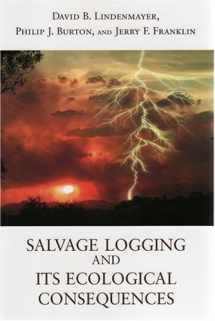
Salvage Logging &_Its Ecological Consequences (2008 publication)
ISBN-13:
9780643095922
ISBN-10:
0643095926
Author:
David B. Lindenmayer
Publication date:
2016
Publisher:
Island Press
Format:
Paperback
FREE US shipping
Book details
ISBN-13:
9780643095922
ISBN-10:
0643095926
Author:
David B. Lindenmayer
Publication date:
2016
Publisher:
Island Press
Format:
Paperback
Summary
Salvage Logging &_Its Ecological Consequences (2008 publication) (ISBN-13: 9780643095922 and ISBN-10: 0643095926), written by authors
David B. Lindenmayer, was published by Island Press in 2016.
With an overall rating of 3.7 stars, it's a notable title among other
books. You can easily purchase or rent Salvage Logging &_Its Ecological Consequences (2008 publication) (Paperback) from BooksRun,
along with many other new and used
books
and textbooks.
And, if you're looking to sell your copy, our current buyback offer is $0.3.
Description
Salvage logging—removing trees from a forested area in the wake of a catastrophic event such as a wildfire or hurricane—is highly controversial. Policymakers and those with an economic interest in harvesting trees typically argue that damaged areas should be logged so as to avoid “wasting” resources, while many forest ecologists contend that removing trees following a disturbance is harmful to a variety of forest species and can interfere with the natural process of ecosystem recovery. Salvage Logging and Its Ecological Consequences brings together three leading experts on forest ecology to explore a wide range of issues surrounding the practice of salvage logging. They gather and synthesize the latest research and information about its economic and ecological costs and benefits, and consider the impacts of salvage logging on ecosystem processes and biodiversity. The book examines • what salvage logging is and why it is controversial • natural and human disturbance regimes in forested ecosystems • differences between salvage harvesting and traditional timber harvesting • scientifically documented ecological impacts of salvage operations • the importance of land management objectives in determining appropriate post-disturbance interventions Brief case studies from around the world highlight a variety of projects, including operations that have followed wildfires, storms, volcanic eruptions, and insect infestations. In the final chapter, the authors discuss policy management implications and offer prescriptions for mitigating the impacts of future salvage harvesting efforts. Salvage Logging and Its Ecological Consequences is a “must-read” volume for policymakers, students, academics, practitioners, and professionals involved in all aspects of forest management, natural resource planning, and forest conservation.


We would LOVE it if you could help us and other readers by reviewing the book
Book review

Congratulations! We have received your book review.
{user}
{createdAt}
by {truncated_author}


